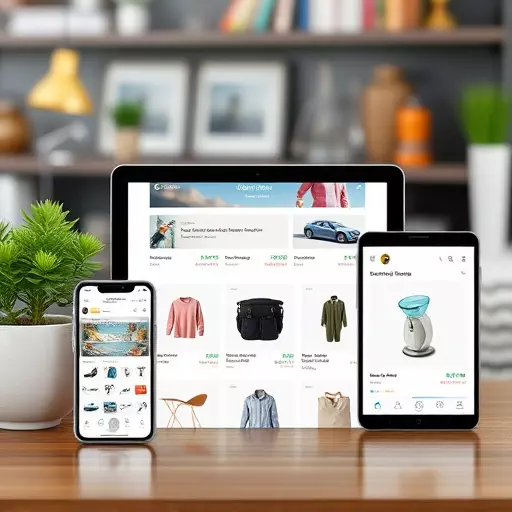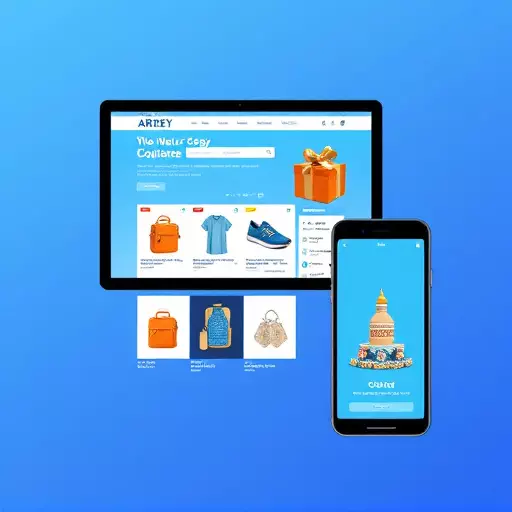In today's digital era, a mobile-first approach is crucial for New Jersey businesses aiming to excel in e-commerce. With most internet users accessing websites via mobile devices, responsive design ensures an optimal shopping experience across all screens. Custom e-commerce development services create tailored interfaces, resulting in faster loading times, improved navigation, and higher customer satisfaction, ultimately driving sales and keeping businesses competitive. A seamless user experience is key to success; strategic custom e-commerce design increases customer satisfaction, retention rates, and provides a competitive edge in the market.
In today’s digital era, having a robust and accessible online presence is non-negotiable, especially for New Jersey businesses. This is where responsive e-commerce design steps in as a game-changer. Understanding the fundamentals of responsive design and implementing a mobile-first approach are key to attracting and retaining customers. This article explores these aspects, delving into the significance of mobile-first e-commerce design for NJ businesses and highlighting the benefits of custom e-commerce development for creating seamless user experiences across various devices.
- Understanding Responsive E-commerce Design: The Basics
- Mobile-First Approach: Why It Matters for New Jersey Businesses
- Custom E-commerce Development: Creating a Seamless User Experience
Understanding Responsive E-commerce Design: The Basics

Responsive e-commerce design is no longer a luxury but a necessity in today’s digital landscape. It involves creating websites that seamlessly adapt to various screen sizes and devices, ensuring an optimal user experience across desktops, tablets, and mobile phones. With over half of all internet traffic now coming from mobile devices, implementing mobile-first e-commerce design strategies in New Jersey is crucial for businesses to stay competitive.
A well-designed responsive e-commerce platform offers more than just a visually appealing interface; it enhances functionality and usability. Custom e-commerce development allows businesses to tailor their online stores to specific needs, ensuring fast loading times, easy navigation, and seamless transactions, regardless of the device used. This approach not only improves customer satisfaction but also boosts sales and conversions, ultimately contributing to the success of any online retail venture.
Mobile-First Approach: Why It Matters for New Jersey Businesses

In the realm of modern e-commerce, a mobile-first approach is no longer an option but a necessity for New Jersey businesses aiming to thrive online. With a significant portion of internet users accessing websites through their smartphones and tablets, responsive e-commerce design has become crucial for providing an optimal shopping experience across all devices. A mobile-first strategy ensures that your e-commerce platform prioritizes the smaller screen sizes, making it easier for customers in New Jersey to browse, search, and make purchases on the go.
By adopting this approach, custom e-commerce development services can create a seamless, user-friendly interface tailored specifically for mobile users. This means faster loading times, improved navigation, and better readability, all of which contribute to higher customer satisfaction and increased conversions. In today’s digital era, New Jersey businesses that invest in responsive design with a mobile-first mindset are better positioned to stay competitive, attract a wider audience, and ultimately drive more sales.
Custom E-commerce Development: Creating a Seamless User Experience

In the competitive landscape of modern e-commerce, a seamless user experience is non-negotiable. Custom E-commerce Development in New Jersey offers businesses an opportunity to create unique, mobile-first designs that cater to the diverse needs and preferences of their customers. By prioritizing responsive design principles, developers ensure websites adapt gracefully across various devices and screen sizes, providing a consistent shopping journey whether accessed from a desktop or smartphone.
This tailored approach goes beyond mere aesthetics; it involves crafting intuitive navigation, optimized product displays, and efficient checkout processes. Custom development allows businesses to integrate advanced features such as personalized recommendations, interactive content, and dynamic pricing models, enhancing customer engagement and driving conversions. Ultimately, a well-executed custom e-commerce design strategy translates into increased customer satisfaction, higher retention rates, and a competitive edge in the market.


